实用英语综合教程1 unit1
- 格式:ppt
- 大小:3.05 MB
- 文档页数:217
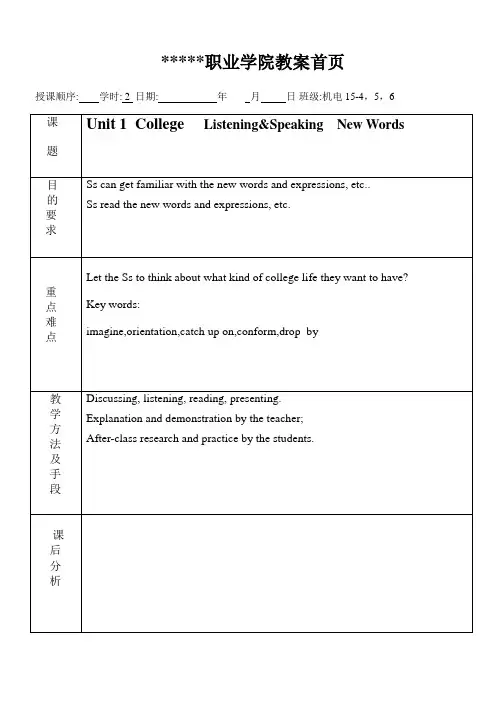
*****职业学院教案首页授课顺序: ___ 学时: 2 日期:___________ 年 ___ 月 ____ 日班级:机电15-4,5,6…………………装……………订……………线………………………教案稿纸化工职业学院第页…………………装……………订……………线………………………教案稿纸化工职业学院第页…………………装……………订……………线………………………教案稿纸化工职业学院第页…………………装……………订……………线…………………教案稿纸化工职业学院第页教案稿纸化工职业学院第页教案稿纸化工职业学院第页内蒙古化工职业学院教案首页授课顺序: _2_ 学时: 2 日期:___________ 年 ___ 月 ____ 日班级:机电15-4,5,6教案稿纸Teaching procedures: Step 1Listen to the tape and read the words and phrases,review the usages of the word.Step 2 Discussion:How do you feel about your beginning of the college life?Step 3 Listen to the tape and underlined the key words and expressions. Step 4 Intensive Reading of Text A.The Freshman Experience: College Is Not Summer CampBy Kristine Wellesley1. The first week of college is summer camp. The second is back to reality. When I arrived on campus a little over a week ago, I never imagined going from name games to essays in a blink.summer camp:夏令营 arrive on 到达 back to reality:回归现实Imagine doing sth.想象做某事I never imagined going from name games to essays in a blink.2.…… so it never really felt like school until I walked intoGeology on Tuesday morning. Before that, I had been watching movies with other freshmen, exploring—well, really getting lost in the campus, and trying every imaginable ice cream combination at the dining halls. Never…until…(never本身是否定 VS.not…until)Had been过去完成时(以过去为基点,发生在之前的事情)filled with strangers作为过去分词短语修饰room3.And then came the terrible syllabus, something I’ve never used before.化工职业学院第页教案稿纸化工职业学院第页…………………装……………订……………线………………………教案稿纸内蒙古化工职业学院第页职业学院教案首页授课顺序: _3_ 学时: 2 日期:___________ 年 ___ 月_____ 日班级:机电15-4,5,6…………………装……………订……………线………………………教案稿纸化工职业学院第页教案稿纸化工职业学院第页教案稿纸化工职业学院第页。
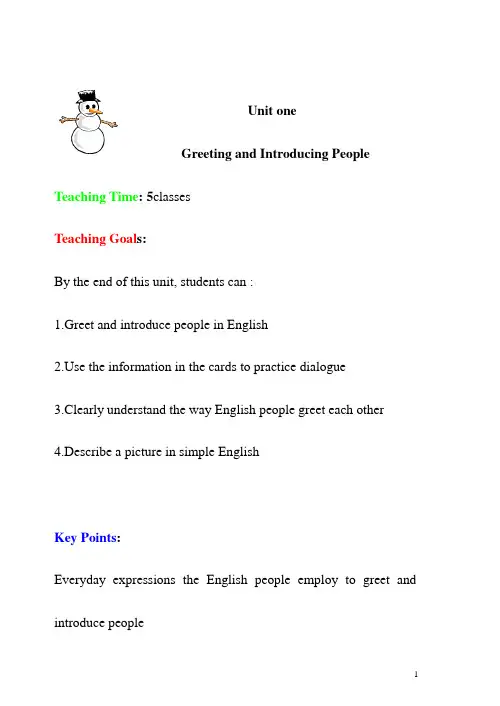
Unit oneGreeting and Introducing People Teaching Time: 5classesTeaching Goal s:By the end of this unit, students can :1.Greet and introduce people in Englishe the information in the cards to practice dialogue3.Clearly understand the way English people greet each other4.Describe a picture in simple EnglishKey Points:Everyday expressions the English people employ to greet and introduce people1st class: 50ms. Talking Face to FaceStep 1 . PresentationⅠ. Introducing myself according to my calling card: Good morning / afternoon, boys and girls! Nice to meet.Welcome to our college! My name is Yao fangfang . My English name is Yvonne. You can call me Mrs Yao or Yvonne as you like. From now on, we will be together through this term. I hope we can get well on with each other. I believe so! At last, I would like to give you my heartfelt wishes for you. May you have good study and campus life here.Ⅱ.Show them my calling card and explanation:first name/given name; (given at baptism)名last name/ family name:姓eg: Eliot T. SamuelⅢ.Give some useful expressions of greeting:A: Meeting people for the first timeHi / hello, nice to meet you. ( nice/glad/ honoured )Or:How do you do?How do you do?B: Meeting people againLong time no see/ how are you/ how have you been?It’s been quite a while, hasn’t it?How are you? Fine / nice/ pretty good/ not so bad/ just so so/ very well.That’s all right.How is your work / family?Ⅳ. Let students introduce themselves to me!Use the expression above.Step 2. Learn the samplesDialogue 1/ Dialogue 2.Ask students read them aloud and then practice them in pairs.Give some advice on how to learn English well.Four basic skills: Read, listening speaking and writing.Step 3. Act out ( homework)Look through and give the task to the students.Practice them in next class.Step 4 ..Homework: read aloud and learn by heart the “data bank”2nd class: Being All EarsKey language points1.leave a good impression upon sb.Your proper greeting leaves a good first impression upon me.2. rather3.each +V single4.that cool but inexperienced man5.I’ve got to6.speak of : mention7. nice to have met you.Step 1: Review check the homework. Act outStep 2. Listen to the dialogue and decode (twice)Step 3. Listen and respondListen to the dialogue again and answer the following questionsStep 4.Listen and completeNow listen to dialogue and complete the following sentences. Step 5. Listen and judge.Step 6.Read—listen—match and concludeMaterial: Introduction are important. P7Section Ⅲ( 3rd and 4th .5 classes) Maintaining a sharp eye Mr.: a courtesy title for any male adult not for styled sir”, “Dr”etc, used before the man’s family name or his position.b.Mrs.:“太太”a courtesy title for any married woman not styled“Lady”,“Dr.”etc.used before her husband’s .surname c.Ms.:“女士”a courtesy bile for a woman,whether she is married or not,followed by the family name.Miss:“小姐”A title to address an unmarried woman or a girl.It is followed by the family name.Miss can also be used as he title of address to an (esp.unknown)unmarrined woman. In this case,it is not followed by the name.l. Explanation of Difficult Sentences.1.(Title)The Way Americans GreetAnalysis:In this title,in which is omitted after the way> in…way means( to do sth ) by means of means a certain method美国人致意的方式Example:I think the way she runs her bookshop is worth studying.2. Speaking of time. I’ve got to run.A present participle clause used as an adverbial of cause/time. It means “ when it comes to time, I am reminded of…”说到时间,我得赶紧跑了。
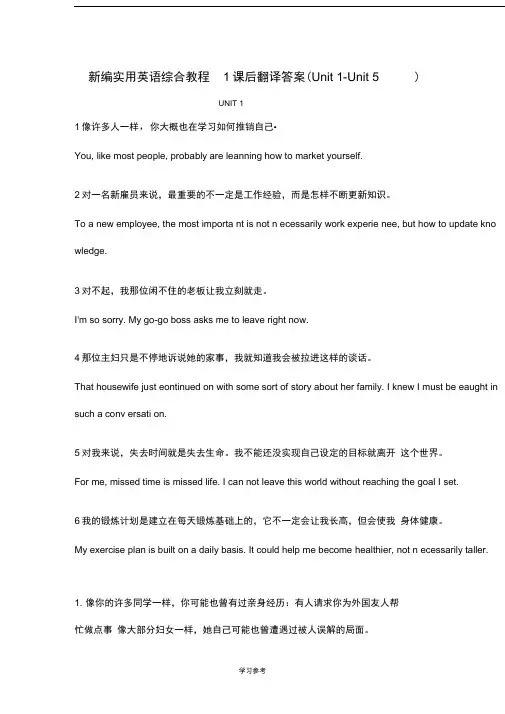
新编实用英语综合教程1课后翻译答案(Unit 1-Unit 5 )UNIT 11像许多人一样,你大概也在学习如何推销自己•You, like most people, probably are leanning how to market yourself.2对一名新雇员来说,最重要的不一定是工作经验,而是怎样不断更新知识。
To a new employee, the most importa nt is not n ecessarily work experie nee, but how to update kno wledge.3对不起,我那位闲不住的老板让我立刻就走。
I'm so sorry. My go-go boss asks me to leave right now.4那位主妇只是不停地诉说她的家事,我就知道我会被拉进这样的谈话。
That housewife just eontinued on with some sort of story about her family. I knew I must be eaught in such a conv ersati on.5对我来说,失去时间就是失去生命。
我不能还没实现自己设定的目标就离开这个世界。
For me, missed time is missed life. I can not leave this world without reaching the goal I set.6我的锻炼计划是建立在每天锻炼基础上的,它不一定会让我长高,但会使我身体健康。
My exercise plan is built on a daily basis. It could help me become healthier, not n ecessarily taller.1. 像你的许多同学一样,你可能也曾有过亲身经历:有人请求你为外国友人帮忙做点事像大部分妇女一样,她自己可能也曾遭遇过被人误解的局面。
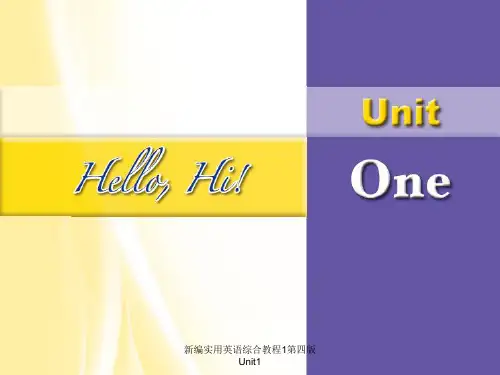
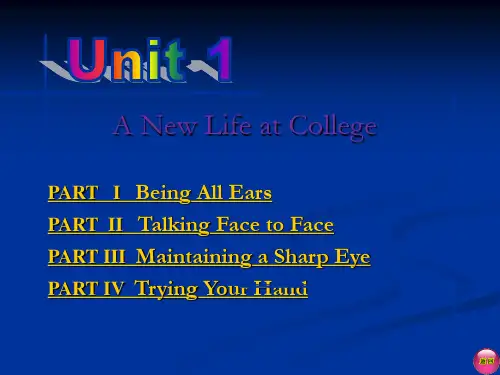
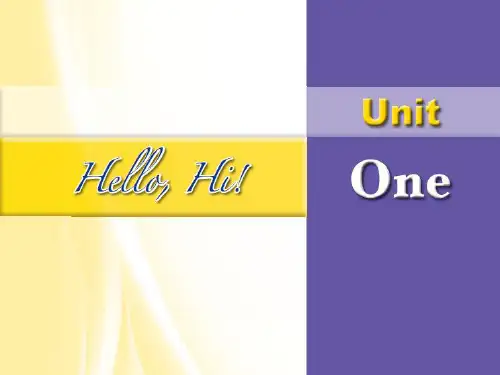

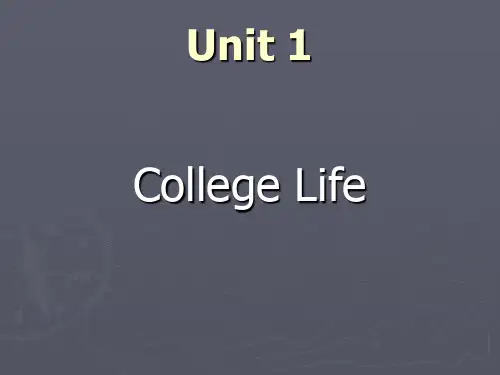
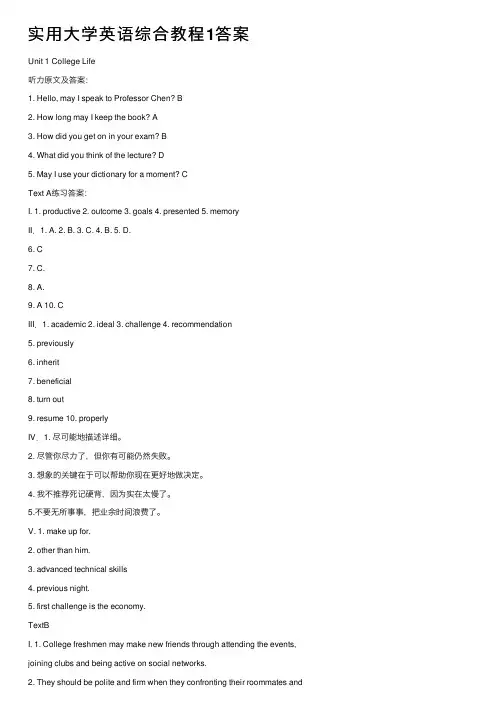
实⽤⼤学英语综合教程1答案Unit 1 College Life听⼒原⽂及答案:1. Hello, may I speak to Professor Chen? B2. How long may I keep the book? A3. How did you get on in your exam? B4. What did you think of the lecture? D5. May I use your dictionary for a moment? CText A练习答案:I. 1. productive 2. outcome 3. goals 4. presented 5. memoryII.1. A. 2. B. 3. C. 4. B. 5. D.6. C7. C.8. A.9. A 10. CIII.1. academic 2. ideal 3. challenge 4. recommendation5. previously6. inherit7. beneficial8. turn out9. resume 10. properlyIV.1. 尽可能地描述详细。
2. 尽管你尽⼒了,但你有可能仍然失败。
3. 想象的关键在于可以帮助你现在更好地做决定。
4. 我不推荐死记硬背,因为实在太慢了。
5.不要⽆所事事,把业余时间浪费了。
V. 1. make up for.2. other than him.3. advanced technical skills4. previous night.5. first challenge is the economy.TextBI. 1. College freshmen may make new friends through attending the events, joining clubs and being active on social networks.2. They should be polite and firm when they confronting their roommates andset expectations and clear boundaries from the beginning.3. Because they may lose out on meeting other people and potential friends. II. 1. confront 2. firmly 3. potential4. offending5. overcome6. acquaintance7. graduation8. gesture9. gossip 10. inevitablyIII. 1. 参加你感兴趣的社团。

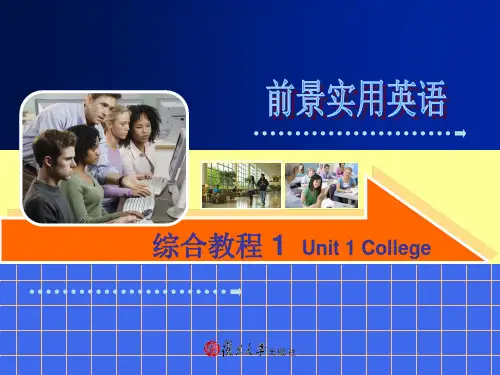
新编实用英语综合教程一重点单词Unit 1: Communication1. Communication - the act of sharing or exchanging information, ideas, or feelings through speech, writing, or other methods.2. Verbal - relating to or consisting of words, spoken or written.3. Nonverbal - not involving or using words; not able to speak.4. Gesture - a movement of part of the body, especially a hand or the head, to express an idea or meaning.5. Intonation - the rise and fall of the voice in speaking, giving meaning to words or sentences.6. Pronunciation - the way in which a word or language is spoken.7. Idiom - a group of words established by usage as having a meaning not deducible from those of the individual words (e.g., "kick the bucket" means to die).8. Slang - informal language that is more common in speech than in writing and typically restricted to a particular group of people.9. Jargon - special words or expressions used by a profession or group that are difficult for others to understand.10. Paraphrase - express the meaning of something using different words, especially to achieve greater clarity.11. Feedback - information about reactions to a product, a person's performance of a task, etc., used as a basis for improvement.12. Barriers - obstacles that prevent communication from being successful, such as language differences or cultural misunderstandings.Unit 2: Jobs and Careers1. Occupation - a person's regular work or profession; job or career.2. Profession - a paid occupation, especially one that involves prolonged training and a formal qualification.3. Employment - the state of having paid work.4. Unemployment - the state of not having paid work.5. Entrepreneur - a person who sets up a business or businesses, taking on financial risks in the hope of profit.6. Resume - a brief summary of an individual's education, qualifications, and previous experience, typically sent with a job application.7. Interview - a formal meeting in which one or more people question, consult, or evaluate another person.8. Career - an occupation undertaken for a significant period of a person's life and with opportunities for progress.9. Job satisfaction - the feeling of fulfillment or enjoyment that a personderives from their work.10. Promotion - the action of raising someone to a higher position or rank within an organization.11. Retirement - the action or fact of ceasing to work due to old age or other reasons.Unit 3: Education1. Education - the process of receiving or giving systematic instruction, especially at a school or university.2. Curriculum - the subjects or topics taught in a school or college.3. Grade - a level of study in an educational institution.4. Homework - tasks assigned to students by school teachers that are intended to be carried out outside of class time.5. Lecture - an educational talk to an audience, especially one of students ina university or college.6. Textbook - a book used as a standard source of information on a particular subject.7. Exam - a formal test of a person's knowledge or proficiency in a particular subject or skill.8. Degree - a qualification awarded to students by a college or university, usually after completing a course of study.9. Major - the subject area that a student specializes in while pursuing a degree.10. Minor - a secondary area of study chosen in addition to a major.Unit 4: Health and Fitness1. Health - the state of being free from illness or injury; a person's mental or physical condition.2. Fitness - the condition of being physically fit and healthy.3. Diet - the kinds of food that a person, animal, or community habitually eats.4. Exercise - activity requiring physical effort, carried out to sustain or improve health and fitness.5. Nutrition - the process of providing or obtaining the food necessary for health and growth.6. Weight - a measurement of how heavy someone or something is.7. Stress - a state of mental or emotional strain or tension resulting from adverse or demanding circumstances.8. Sleep - a naturally recurring state characterized by reduced consciousness and inactivity of the body.9. Disease - a disorder of structure or function in a human, animal, or plant,especially one that produces specific signs or symptoms.10. Allergy - a damaging immune response by the body to a substance to whichit has become hypersensitive.Unit 5: Food and Drink1. Cuisine - a style or method of cooking, especially as characteristic of a particular country, region, or establishment.2. Recipe - a set of instructions for preparing a particular dish.3. Ingredient - any of the foods or substances that are combined to make a particular dish.4. Appetizer - a small dish of food or a drink taken before a meal tostimulate one's appetite.5. Main course - the principal item of food in a meal.6. Dessert - a sweet course eaten at the end of a meal.7. Beverage - a drink, especially one other than water.8. Fast food - easily prepared processed food served in snack bars and restaurants as a quick meal.9. Vegetarian - a person who does not eat meat or fish.10. Organic - relating to or derived from living matter, produced or involving production without the use of chemical fertilizers, pesticides, or other artificial agents.Unit 6: Technology and Innovation1. Technology - the application of scientific knowledge for practical purposes, especially in industry.2. Innovation - the action or process of introducing new ideas, methods, or things.3. Computer - an electronic device that manipulates information or data, typically performing calculations or series of operations known as programs.4. Internet - a global computer network providing a variety of information and communication facilities, consisting of interconnected networks using standardized communication protocols.5. Smartphone - a mobile phone that performs many of the functions of a computer, typically having a touchscreen interface, internet access, and an operating system capable of running downloaded applications.6. Software - the programs and other operating information used by a computer, which are given to it or carried in it when it is switched on.7. Hardware - the physical components of a computer or other electronic device.8. Cloud computing - the practice of using a network of remote servers hosted on the Internet to store, manage, and process data, rather than a local server or a personal computer.9. Artificial intelligence - the theory and development of computer systems able to perform tasks that normally require human intelligence, such as visual perception, speech recognition, decision-making, and translation between languages.10. Cybersecurity - the protection of computer systems and networks against information disclosure, damage, or disruption.Unit 7: Environment and Sustainability1. Environment - the surroundings or conditions in which a person, animal, or plant lives or operates.2. Sustainability - the ability to be maintained at a certain rate or level; the avoidance of the depletion of natural resources in order to maintain an ecological balance.3. Pollution - the presence or introduction into the environment of a substance or thing that has harmful or poisonous effects.4. Climate change - long-term alteration of temperature and typical weather patterns in a place or region.5. Renewable energy - energy derived from natural resources that are naturally replenished, such as sunlight, wind, rain, tides, waves, and geothermal heat.6. Conservation - the preservation, protection, or restoration of the natural environment and of wildlife.7. Recycle - convert (waste) into reusable material.8. Compost - decayed organic matter used as fertilizer, especially a mixture of decaying vegetable matter and manure, commonly used in gardening and agriculture.9. Carbon footprint - the total amount of greenhouse gases produced directly and indirectly by something, expressed as carbon dioxide equivalent.10. Greenhouse gas - a gas that contributes to the greenhouse effect, such as carbon dioxide, methane, or nitrous oxide.Unit 8: Travel and Tourism1. Travel - make a journey from one place to another.2. Tourism - the activity of traveling for pleasure or business; the provision of services for this activity.3. Destination - a place to which someone is traveling or where something is being sent; the ultimate objective of a journey.4. Accommodation - a room, group of rooms, or building in which someone lives or stays.5. Transportation - the action of transporting someone or something or the process of being transported.6. Itinerary - a plan for a journey or route taken by a traveler.7. Attraction - a place that is interesting or beautiful and makes people want to visit it.8. Culture - the arts, customs, and habits that characterize a particular society or social group.9. Visa - an official authorization appended to a passport, permitting the bearer to enter the country issuing it.10. Currency - the system of money used in a country.Unit 9: Art and Entertainment1. Art - the expression or application of human creative skill and imagination, typically in a visual form such as painting or sculpture, producing works tobe appreciated primarily for their beauty or emotional power.2. Entertainment - the action of providing or being provided with amusement or enjoyment.3. Music - vocal or instrumental sounds (or both) combined in such a way as to produce beauty of form, harmony, and expression of emotion.4. Film - a movie; a motion picture.5. Theater - a building or outdoor area in which plays, and other dramatic performances are given.6. Dance - an artistic form of nonverbal communication characterized primarily by the use of movements of the body.7. Literature - written works, especially those considered of superior or lasting artistic merit.8. Museum - a building in which objects of historical, scientific, artistic,or cultural interest are stored and exhibited.9. Gallery - a room or building for the display or sale of works of art.10. Performance - a performance of music, drama, or dance.。
Unit 1 Hello, HiUnit Goals1.Greet people and give responses: first meeting and meeting again2.Exchange personal information: name/address/telephone number/job/study3.Introduce people to each other4.Meet people at the airport5.Say goodbye to others6.Say hello in different languages7.Write a business cardWhat should you know about1.Etiquette of meeting and introducing people2.Etiquette of exchanging business cards3.Basic sentence structuresSection I Talking Face to Face1.Imitating Mini-Talks2.Acting out the Tasks3.Studying Email Information on the Internet4.Following Sample Dialogues5.Putting Language to UseSection II Being All Ears1.Learning Sentences for Workplace Communication2.Handling a Dialogue3.Understanding a Short Speech / T alkSection III Trying your Hand1.Practicing Applied Writing2.Writing Sentences and Reviewing GrammarSection IV Maintaining a Sharp EyePassage 1 :Information Related to the Reading PassageEnglish Expressions Borrowed from FrenchOver the long years, the English language has borrowed a great number of French words or expressions. Some of them have been so absorbed in English that speakers might not realize their origin. Other expressions like “faux pas” have retained their “Frenchness”, with which spe akers tend to sound modern. These expressions are often written in italics. The following are a few French expressions which are commonly used in English.1. Faux Pas: It refers to a socially awkward or tactless act, a foolish mistake, something that should not be done. 失礼2. au pair: A foreign female student who works for a family (cleaning and/or teaching the children) in exchange for room and board. 帮助料理家务换取住宿的外国女学生3. Bon appétit: The closest English equivalent is “Enjoy your meal” . 用餐愉快4. esprit de c orps: It is similar to “group spirit” or “morale”. 团队精神5. rendez-vous: In English it means “go to”. It can be used as a noun or a verb. 约会6. RSVP: This abbreviation stands for Répondez, s'il vous plaît, which means “Respond, please”.敬请回复7. bon voyage: a way of saying goodbye and wishing good luck 一路平安The Business Card: a Social Faux PasYou, like most people, probably have been in such a situation where you are being asked for a business card, and while reaching for it ... and ... oops ... “I'm sorry, I must be out at the moment” or “they must be in my other bag” or “I left them at the office, I'm sorry,” and the conversation continues on with some sort of story about how this “never happens to me” or “I knew I was forgetting something this morning ...”Missed connections are missed opportunities for business. Business cards are a useful marketing tool, and an easy one to have with you at all times. Not having your cards can be seen as being unprepared to market yourself and your business. Don't start that new contact leaving them thinking “that person is already unprepared”.“Never leave home without it ...” There are so many things we often have to remember in this go-go world we are living in … but your business cards should ALWAYS be with you.Here are a few tips for you to go take care of this right now, so you don't get caught in this situation:✧ If you don't have a job, get Networking Cards.✧ If you are employed, and haven't had new cards in 2 or more years,it couldbe time for an update: info update and photo update ...✧ Perhaps set a goal of handing out 5 cards a day.✧ Practice what you will say when handing them out. On a daily basis, there are so many opportunities to do so. Grocery store lines, coffee shops, waiting on your car wash, meetings, and even the dog park!✧ Ask your network to network with and for you also by handing out a few!Work smarter, not necessarily harder!Language Points1 Explanation of Difficult Sentences1. (Para. 2) Missed connections are missed opportunities for business. Analysis: Missed is a verb's past participle used here as an adjective. The repeated use of the same word could bring out a stronger effect. Translation: 错失了联系就错失了商机。
Unit 1 EducationObjectives:After studying this unit, the students are expected to be able to1.grasp the basic ideas or information about Bill Gates and education abroad;2.understand the main idea of text A and master the useful words, sentences structures & phrases ;3.learn the grammar: nouns;4. read, spell and use the new words and phrases in this unit;5. be well-acquainted with the ways of introducing yourself, introducing someone and responding to introduction;6. practice writing: Introducing YourselfFocuses:1. V ocabulary: (omitted)2. Speaking: the importance of education3. Grammar: nouns4. Practical writing: Introducing YourselfMethods:(1) Listening, Speaking and Reading;(2) Discussion;(3) Presentation;(4) Exercises;(5) Writing.Contents:Step 1. Listening and Speaking & Warm-up DiscussionAsk the students to talk about the importance of education;Step 2. Background Information(1) Bill Gates;(2) Education in China;(3) Education Abroad;(4) Related Words: 大学专科:short 2-3-year higher education重点大学:key university注册人数:enrollment希望工程:Project Hope义务教育:compulsory education普及教育:universal education伙食补助:food allowance学分制:the credit system辅导员:assistant for political and ideological work学生会:students‘ union专业课:specialized course必修课:required / compulsory course选修课:elective / optional course奖学金:scholarship专业:major补考:make-up examination系:departmentStep 3. V ocabulary in Text ALead the Ss to read new words and expressions and then read the new words together. Explain the important language points.1.education n.教育e.g. Children in poor areas receive free education.贫困地区的孩子接受免费教育。